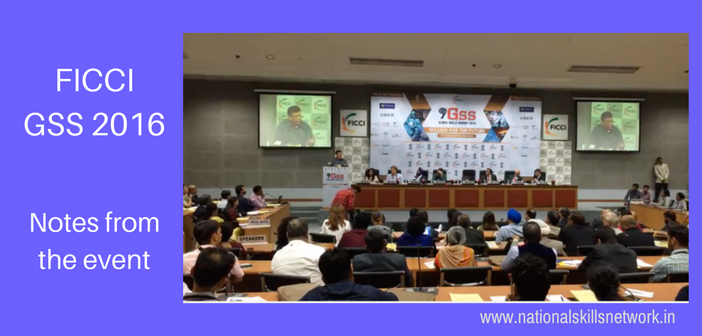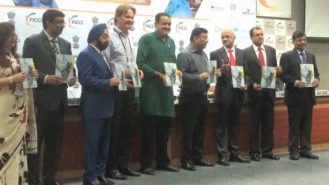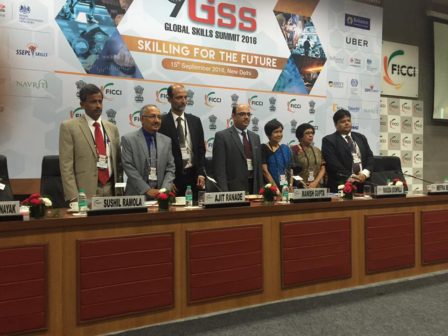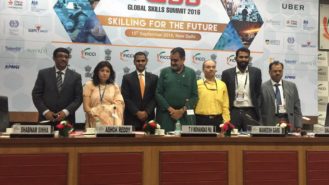The one-day FICCI Global Skills Summit or the 9th GSS held in Delhi on 15th September saw active participation from the industry, the government, the training partners and the academia to discuss and deliberate a host of issues related to skill development, employment and employability with emphasis on ‘Skilling for the future’. The inaugural session had Mr. Mohan Das Pai, Chairman, FICCI Skill Development Committee, welcoming the participants, followed by a special presentation by Mr Onno Ruhl Country Director- India ,The World Bank. The session was moderated by Ms. Shobha Mishra Ghosh and it included the release of FICCI-KPMG Report and the launch of FICCI- NASSCOM Study.
The event was a wonderful opportunity to learn and get updated on the future skills and jobs in India. We were lucky to watch the event live on YouTube and managed to make notes of the key points shared and discussed by the chairpersons, speakers, panelists and audience. We present to you a summary of the sessions except the inaugural sessions since this was not available due to streaming server issues.

Session 1: Re-engineering Skills Ecosystem
The session was chaired by Mr Rohit Nandan, Secretary MSDE. Here are some key points from his presentation:
- The government has handed over the entire training to private industry through NSDC. Industry plays a crucial role – QPs and NOS has to be decided by the industry – assessment, placement, certification etc
There will not be any shortage of funds as the initial budget of 1500 crore rupees is raised to 36000 crore rupees - With Skill India mission, India is midway through an HRD exercise of a size that has never been seen by the humanity even in this history – 40 crore mind boggling 1.5 crore people have to be trained every year (1.4 crore trained last year, 38% rise over previous year’s achievement) close to the target and a reality
skilling capacity is created , that was dormant, inherent is discovered – 20 % increase of ITIs - Issue of quality arises because there is mosaic of training taking place and no logic in it – People offer 7 days to 3 months of training for the same program, certification does’t assure quality. Now they have to adhere to NSQF, at least we are sure of the levels of qualification, irrespective of the training center – the level would be the same. The government is able to implement the common norms as training duration and cost is standardised
- Thanks to NSDC, we are able to publish modern curriculum for 250 jobs, 80% of popular jobs in India. course content for 92 job roles – moving towards uniformity, can ensure quality as per national levels benchmarked with international standards 82 from UK, 28 from Australia, adopted by us – these standards are acceptable anywhere in the world so employable anywhere in the world –
- The aim is to make India skilled capital of the world 15 international skill centers training 8 to 10 lakh people – who are dropouts – they should be highly skilled – not because they are cheap labour – They should demonstrate competence and excellence – just like IT and nursing professionals
- For sustainability , we need to have proper industry connect – candidates should be able to get a job – people should be satisfied at the end of training – we’ve created an army of unemployed and we cannot afford to now army of skilled unemployed. industry should engage them – this part of the industry value chain still needs to be worked upon.
- Sector skill councils (SSCs) should be demand aggregators – industry is still not able to share their need for employment in the next one year. we need to know that x type of people for x number of jobs – we can produce them with right quality.
Mr Arthur Glattli : Dy. Head, Training and Innovation – Swissmem (Skillsonics)
- Swiss Vocational Training initiative are most successful all over the world
- We focus on private initiatives, supported by government through TOT, career guidance, counselling
- There is deep involvement of Pvt sector and implanting and shaping the VT landscape – skillset levels required by the economy – productivity gains, competitiveness, innovation
- government creates favourable environment – companies engaging in VET get good ROI since the ecosystem is created with quality of trainers, assessors

Meenakshi Nath – Head of the Inclusive Growth and Investments Team, DFID India
- Referred to the dialogue between the Prime Ministers of UK and India about preparing Indian youth for future
- Importance and priority for bilateral relationship – executed in 4 ways: – 1 setting standards for SSCs like food processing and handicrafts linked with UK sectors;
- 2. collaborating with states MP and Jharkhand – RPL pilot- 5000 plumber and welders were certified, set the MIS 3. corp engagement – own business growth of UK corporates 350000 people in India both internal and CSR
- 4. working with youth – inspire them, British Council and World Skills UK to create role models and establish centers of excellence and consolidate,
Dr Darlie Koshy DG & CEO, ATDC & IAM
- We need to move away from numbers and connect with emotions; DNA connects Indian women to fashion and apparel industry – we have a very short window of opportunity – we seem to take this period in one sweep of the brush – women should be brought from marginal to main workforce through apparel sector 82% training for women – there’s need for understanding the criticality of the issue
- Skill has one fundamental truth, it has to be demonstrated, with precision and speed, in a context so that it a competency.for this QP and NOS has to be in a narrow segmented manner (standard and value will go down )
- Why do we need 40+ SSCs? it should not be more than 20 or 21 – Let world skills be a benchmark
- 80% of the jobs are created in 10 sectors – we need an ecosystem and not create a highly complex web of micromanaging 100s of courses – for example, women pick up only 3 sectors (apparel, BW an ICT) – SSC have to link industry to employment seeking youth
Session 2: Future Skills: Technology, Jobs and Talent
The session was chaired by Mr Amitabh Kant, CEO , NITI Aayog. Some key points raised during the session and discussed by the chairperson:
- How prepared industry is to employ the skilled person without a degree – it’s got a be a partnership with private saying there will be employment long term collaboration, view , not in isolation
- how does skilling benefit society we are not there as yet today -industry ease of business, industry will require people
- We need to speed ahead with technology, smart intelligent manufacturing – India advantage – like we had good programmers – manufacturing will converge with digital and it will become fashionable
- Through convergence – shop floor and retailer and consumer come together; consumer’s decision will pass on immediately to shop floor
- In India, every state in state should realize what its core competency is and excel in that core competency – Kerala cannot be a smart manufacturing destination— imagine cement factories on backwaters of kerala, will destroy the tourist destination
Mr Sharad Sharma, Co-founder, Ispirt Foundation spoke about the new disruption in technology and scope for economic progress
- A name for new Era – Cambrian Explosion of Everything income inequality can be corrected through technology democratisation and innovations in small towns and cities
- Can we unleash 10 million world class innovators in India – no name for the new era yet – digital new payment system, have Aadhar, we will soon live digital
- what do disruptive technologies mean in terms of skills, 3 trillion dollar value – how is India preparing for these skills – we as a nation cannot miss it – trend is unstoppable
Mr L R Sridhar, Co-Founder,CEO & MD, Connect India E-commerce Services Pvt Ltd
- Refers to the scope of e-commerce – 10% of total retail market, we need to look at rural and urban – industry 4.0 is limited to urban.
- 70% of rural India has so much potential in terms of commerce that can happen – job creation is possible – need to connect to online retailing that will grow big, technology enablement helps rural empowerment – services e.g.: tractor repair in village through micro enterprise, cutting time –
- There is scope for 500000 jobs through 100000 entrepreneurs through distributed manufacturing, logistics ecosystem has to be created
Mr Venkatesh Valluri, Chairman & Managing Director, Valluri Technology Accelerators/ Valluri Change Foundation
- What is the disruption required to create jobs
- We need a paradigm shift in outlook towards education and employment
- There has to be a change in education system, how do we redefine curriculum – how do we include issues like water and environment in the curriculum
Amit Jain, President- India, Uber Technologies
- Uber and its connection with industry and disruption and future
- It’s about industry mobility – 1 million opportunities from Uber, car ownership market – 10 trillion dollar car ownership industry
- How we’ve disrupted “owning a car” – second most asset after a house, that too a depreciating on
- Transportation as a service – we are disrupting private car owners – what is best for society – rider and driver partners and contributed to reducing pollution through pooling
- Government has to play a role – domestic and foreign players – level playing field will the current jobs go away we need to adapt our ed system and modify and accept reality
- Digital systems are designed for training to happen on its own, for example, by day10 the driver get trained
Session 3: Skills for migration : Mobility
The session was chaired by Mr Sushil Ramola, Co-Founder & Chairman, B-ABLE. Since the video streaming was poor, we could not make notes from all the presentations. Here are some key points from Ms Panudda Boonpala, Director- India, ILO and Dr Meera Sethi, Special Envoy to India, International Organization for Migration
- In addition to technical skill training there is a need to invest in soft skills that employers look for. Soft skills have proven to be an important indicator for success in the labor market.
- There is also a need to invest in multi skilling. For ex: In the tourism industry we need people who can work in the front desk as well as customer service. Multi skilling increases market productivity and mobility.
- Mostly due to proximity issues India and the other South Asian countries look for other countries for a large number of work force. The governments have taken initiatives to focus on the labor market. There are a lot of job opportunities but however there is a continuous drop in oil prices and this can have a large impact on the demand side of the labor market. In the demand side, there are many situations that impact the labor market .
- Many countries are eying India’s demographic dividend and looking for selective workforce . those are opportunities that have to be explored. Indian government’s study into the labor market there have been issues in the qualifications of Indian workforce, we need to look into the quality and changes in the work force.
- There has been a debate between the demand and supply of labour market in any country and this topic, countries have been working a lot. Managing the demands and supply is always a challenge and here the private sector plays a major role in understanding the needs of the industry.
- For international relations, the bilateral agreements are also a way to look at the demands of the labour market. Indian diaspora is the largest and most diversified, we have low, semi and entrepreneurs. There is a lot of policy making involved.
- Contemporary migration can be diversified as highly skilled professionals into the US and semi skilled workers into the gulf countries. 800,000 people who migrate are mostly from Kerala, AP, Tamil Nadu but now it is from west Bengal, UP and Maharashtra.
- Highly skilled professionals need very little govt intervention but for semi skilled we need more involvement from reaching and to making arrangement
Session 4: Integration of education and skills
The session was chaired by Mr. Mohandas Pai, Chairman, Manipal Global Education. Some points from his presentation: The biggest challenge today is that a lot of people are coming into the formal education sector though they don’t have the ability to communicate, no idea about soft skills , employee benefits and any other such things. Most of them are first timers and do not know how to compete in the sophisticated industry. We have to guarantee that this skilled employee receives the same amount of respect and dignity as a B.Sc plumbing or electrical.There is a social angle, skills angle and a policy angle and all of these have to be integrated.

Mr Maneesh Garg , Joint Secretary (SE.L) MHRD, GoI
- Skills are very important in our global society and many skills like vocational, communication, speaking all help convert a country into a global economy, Skills have so much importance that even the sustainable goals for 2030 have primarily mentioned skill development as a very important factor.
- 7500 schools (out of 36000 schools) in India (1.5 million student) – vocational integration – only for govt schools presently – expanding capacity, integrating with industry – employment, higher ed or entrepreneurship – assessment and certification (school and industry jointly)
- We have always seen that skill and education have been mentioned separately. There is need for an integration of vocational education and regular education and there is a scheme in the Skill development department, there is not much focus in this. Earlier we did not have the social status
- Earlier class 11 and 12 did have a vocational stream of education and this stream was seen as a way out for the children who were seen as a not so good in academics. However, instead of having a separate course for vocational education it is required to have an integrated system.
- Presently it is provided as a subject in class 9 itself. Class 9 to 12 a student can choose a vocation of their choice, and can graduate from level 1 to 4 as per NSQF
- Courses are offered as per the sector skill council job roles offered by MSDE, curriculum is developed by industry and a partnership with school. Skill sets keep evolving over a period of time, courses are offered to all as an elective subject.
- Flexibility is provided in opting and the advantage in aligning with NSQF there is a possibility of horizontal and vertical mobility.
Ashok Reddy, CEO and Co-founder, Teamlease Services Limited
- Today we only have 300000 apprentices – if the earlier Apprenticeship Act was enforced as it should have been, today we would have had 3 million apprentices or 3000 CEOs in jail! – we have neither of those. So there’s a huge shortfall on that!
- There is need to match demand -supply of workforce
- There is a mismatch of skill sets and what is education churning out impacting the pipeline
- NEEM notification was path breaking in that it connected learning and earning; best way to learn is on the job – favourable changes for the private sector to participate in apprenticeship,
- We need to innovate and find more new recipes than throw more cooks into the kitchen, its about effective utilisation of resources
Ms. Shabnam Sinha, Senior Education and Institutional Development Specialist, The World Bank
- World bank does results based financing for states while investing in skills segment
- Focus from the education sector – cognitive and non-cognitive skills – enhancing the quality of education is a problem – skills deficit , low learning levels is reducing the marketing – it affects the stock and the flow
- Set the institutional mechanism in place , support NSDA for rolling out NSQF and market relevant programs , National Skills Certification Board – credibility of certification , and strengthening SSCs and creating a COE for trainers and assessors, LMIS, creating skills fund PPP that will be run by – NSDC – 200 million dollar support to NSDF from GOI– seed funding for corporate support through CSR
Dr. A.K Srivastava, Vice President – Competency based Education, Amity University
- How Amity University is marrying industry and academia by combining knowledge and skills
- Lower level skills and it the technology changes how do we address it – we have forgotten demand side, we focus on supply (knowledge + skill + soft skills)
- Amity had 100 % employability – close collaboration with industry and assessment agencies – innovator (Tata Technologies)
Mr. Manish Kumar, CEO, NSDC
- Integration of education with skills people should have proper perspective
- Create an ecosystem for the industry to understand how to price the skills, make industry pay the premium
- Need of flexible, interoperable ways ot move from skilling to formal education
- one issue – need for behavioural change, historically we’ve priced education – skills have been classified according to caste system – ITIs never took off – dignity – advocacy – 500 community radio to promote values, RPL, need to celebrate excellence in skills
Concluding session
Mr. Mohandas Pai, Ms Shobha Mishra Ghosh and Mr Mr Bijay Sahoo, Co-Chair, FICCI Skill Development Committee, concluded the session after a brief recap and an appreciation of the audience.
*Disclaimer: This is not a complete report on the event; it is a summary of points jotted down while watching the sessions as it was streamed live on YouTube. Since there were technical problems while streaming, there is a loss of some info. Some pictures are taken from FICCI Skill Development Facebook page.





Comments 2